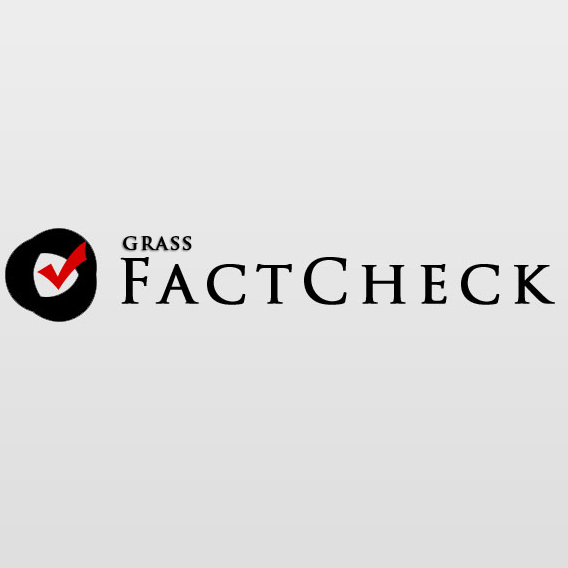Vakhtang Tsintsadze: “Georgia’s economic growth is twice that of other EU candidate countries.”
Verdict: FactCheck concludes that Vakhtang Tsintsadze’s statement is TRUE.
Georgia, Ukraine and Moldova applied for EU membership in March 2022. Ukraine and Moldova were granted candidate status in June of the same year whilst Georgia received the status in December 2023.Eight other countries alongside Georgia hold EU candidate status: Ukraine, Moldova, Albania, Bosnia and Herzegovina, Montenegro, Serbia, North Macedonia and Turkey. Georgia’s economic growth rate has outpaced that of every other EU candidate state since 2022 (the year the country submitted its membership application). Furthermore, Georgia’s economy expanded by a total of 31% between 2022 and 2024 whilst the average growth across other candidate countries, excluding Ukraine, constituted just 10%. Projections suggest Georgia will continue to lead its peers in GDP growth through 2026-2030.Discourse remains over what has led to such rapid growth and how inclusive it truly is – yet the fact stands: Georgia has recorded one of the fastest-expanding economies in recent years not only in Europe but globally. Considering the aforementioned, FactCheck concludes that Vakhtang Tsintsadze’s statement is TRUE.
Analysis
Commenting on Georgia’s economy, Vakhtang Tsintsadze stated: “High economic growth trends continue into 2025 – Georgia’s average growth rate constitutes 8% as per the data for the first seven months. It should be noted that Georgia holds one of the highest growth rates amongst European, Asian and regional countries. I would also highlight that Georgia’s economic growth is twice as high as compared to EU candidate countries.”
Eight other states hold EU candidate status alongside Georgia: Ukraine, Moldova, Albania, Montenegro, North Macedonia, Bosnia and Herzegovina, Serbia and Turkey. Although negotiations with Turkey are frozen, the country still formally retains candidate status.
Georgia’s economy expanded by 9.4% in 2024 – a figure that ranks amongst the strongest not only in Europe but globally. Higher growth was recorded only in oil-rich Guyana and in Northern Mariana Islands – a non-UN member territory with a population of just 56,000.
The fastest growth amongst other EU candidates was in Albania at 4% whereas the lowest was in Moldova at 0.1%.
Graph 1: GDP Growth Rates in 2024
Source: World Bank
Georgia, Ukraine and Moldova applied for EU membership in 2022. Ukraine and Moldova were granted candidate status that same year whilst Georgia received it in 2023. Georgia has consistently ranked first amongst all candidate countries – including Ukraine and Moldova – in economic growth. Ukraine’s economy contracted by 29% in 2022 due to Russia’s invasion, marking that year an outlier for comparison. The growth gap between Georgia and the remaining even candidate states is nonetheless striking.
Table 1: GDP Growth Rate
Source: World Bank, National Statists Offices
Whilst 2025 figures are still yet to finalise, any revisions are unlikely to change the overall picture. An analysis of the past three years shows that Georgia has consistently held the lead. Georgia’s economy grew by 11% in 2022 with the average for other candidate countries – excluding Ukraine – standing at 3.1%. Their average growth rate reached 3.7% in 2023 which then dropped to 2.8% in 2024.
Georgia’s economy expanded by a cumulative 31% between 2022 and 2024. Montenegro ranked second with 16% growth. Moldova’s economy contracted by 3% whilst Ukraine’s by 23% due to the steep decline in 2022. The other candidate countries – again excluding Ukraine – averaged just 10% cumulative growth, three times lower than Georgia’s.
Graph 2: Cumulative Growth Rates over 2022-2024
Source: World Bank
Georgia’s economy is expected to grow by around 5% annually between 2026 and 2030 according to IMF forecasts – a rate that still exceeds that of other candidate countries, although the gap is projected to narrow.
Generally, poorer countries have greater growth potential. Turkey, Serbia and Montenegro all have a higher GDP per capita than Georgia amongst all EU candidates, although the difference is not especially large. The GDP per capita PPP exceeds that of only two EU members in Turkey’s case – Latvia and Bulgaria. In Serbia and Montenegro, it is below Bulgaria’s level. This suggests that Georgia’s rapid growth in recent years cannot be explained solely by its status as a relatively poor country with more catch-up potential.
Annual economic growth never exceeded 6.1% under the Georgian Dream’s governance, before the Russia-Ukraine war (with 2021 as an exception, when the base effects from the previous year’s contraction pushed growth higher). Georgia’s economy grew at an average of 4.7% a year between 2013 and 2019. By contrast, the average growth pace nearly doubled to 9.4% from 2022 to 2024 – a surge at least partially driven by the war’s indirect effects. Remittances from Russia to Georgia spiked following the outbreak of the war (especially in 2022 and 2023). The number of Russian companies registered in Georgia also rose sharply whilst re-exports to Central Asian countries surged. Much of the re-exported products to Kyrgyzstan and Kazakhstan were likely destined for Russia as their final market.
Russia was hit with international sanctions after 24 February 2022 and maintaining economic ties with the country became risky in many cases. FactCheck stresses that it only seeks to explain the reasons behind Georgia’s recent growth and does not claim that the country is violating sanctions. The registration of Russian companies in Georgia, the receipt of remittances from Russia or the re-export of cars to Kyrgyzstan that may later end up in Russia do not in themselves constitute sanction breaches.
Georgia’s recent high growth rates often raise the question: has this translated into real improvements in living standards? Economic growth does not automatically mean a universal rise in well-being. Its benefits are often distributed unevenly, largely reaching groups already engaged in the formal economy. Whilst the growth generally has a positive long-term effect on living standards, its impact may be limited to a narrower segment of society in specific periods or under particular conditions. Whatever the drivers of Georgia’s high growth and however unevenly its benefits are shared, the fact remains: Georgia has recorded one of the fastest-expanding economies in recent years, significantly surpassing that of every other EU candidate country.
Considering that Georgia’s economic growth rate has sharply outpaced all other EU candidate countries in recent years and continues to do so in the current year, with forecasts also placing it ahead in the coming years – FactCheck concludes that Vakhtang Tsintsadze’s statement is TRUE.
Note: FactCheck verified only the economic data. For analysis of the political dimension – why Georgia-EU relations have deteriorated and why accession talks have not been launched – see FactCheck’s articles at the following links (Link 1, Link 2).








